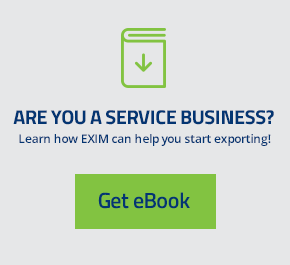Discounting, also known as invoice discounting, is a process whereby you use your business’ accounts receivable invoices as collateral to borrow working capital from a financial institution (a discounter). Discounting can be advantageous to your business by empowering you to access working capital against a percentage of the value of your accounts receivable. Having working capital now allows your business to begin work on other projects and win more sales before receiving payment for existing orders, which if sold on open account terms could take months. Over time, you eventually pay back the discounter the amount lent, plus interest and fees, just like any other business loan.
How Does Discounting Work?
- You, the exporter, export goods or services to foreign buyers on open credit, meaning that you will allow buyers to pay you back in the future (usually 30, 60, 90 or 180 days after delivery of the goods or services)
- You list the amounts owed by your foreign buyers as accounts receivable on your balance sheet. You then contact a financial institution (discounter) that will discount the receivables.
- The discounter gives you a percentage of the amount that you are scheduled to receive from your foreign buyers in the future.
- Every time you make a new sale on credit and add to your accounts receivable, the discounter advances you the same percentage of the new receivables
- Finally: Every month you pay the discounter a fee plus interest on the total amount of funds the discounter has advanced to you.
Isn’t Discounting Like Factoring?
Discounting, like factoring, allows your business to access capital by using your accounts receivable. However, when you discount your receivables, you retain control of those receivables, meaning that your foreign buyer continues to pay you directly for your exports while you remain responsible for pursuing buyers who fail to pay on time.
Meanwhile, factoring results in a financial institution (factor) taking full control of your accounts receivable. The factor becomes the recipient of your foreign buyers' payments and further acquires the responsibility for pursuing foreign buyers that default.
Different discounters and factors offer different rates for their services, so you should research the costs of available discounting and factoring options to determine whether those costs are suitable for your business.You should also consider your business' capacity to manage a foreign buyer’s credit risk. If you have the resources to pursue foreign buyers should they default on the credit you have extended to them, discounting may be an appropriate option for you. But if your resources for buyer credit management are limited, factoring may help grow your business by outsourcing credit management to a factor.
Are There Any Alternatives?
Export Credit Insurance is an alternative finance solution that can help you discount or factor your foreign receivables without selling your accounts receivable or paying interest on a working capital loan. A primary concern of export businesses is accessing working capital, especially when accounts receivable are overseas and outside of local jurisdictions. Before financial institutions give your business a line of credit or working capital, they will want assurances that your business will be able to pay back the amount they lend to you against your foreign receivables, plus interest and fees. An Export Credit Insurance policy gives you and subsequently your financial institution the assurance that you will be paid for your foreign receivables, and should your foreign buyers not pay that you will be reimbursed up to 95% of your invoice amount. With export credit insurance, financial institutions may be more willing to lend against your foreign receivables knowing that they are insured. Thereby your business can access all the benefits of discounting and factoring without additional costs or paper work.
The Export-Import Bank of the United States (Ex-Im Bank) and its recognized partners offer a variety of products and services that complement or can substitute for discounting or factoring. Export Credit Insurance insures your business against nonpayment for U.S. made products and services sold overseas, while the Working Capital Guarantee program and Global Credit Express can provide your business access to the pre-export capital required to capture sales.
No transaction is too small to be financed with Ex-Im Bank support. Learn more by downloading Ex-Im Bank's Small Business Product Guide below, or request a consultation with a Trade Finance Specialist today!
